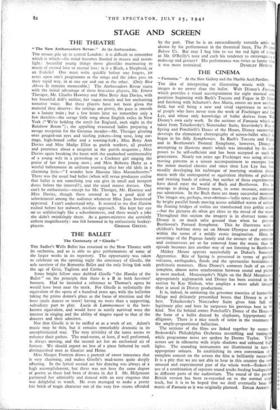STAGE AND SCREEN
THE THEATRE
4, The New Ambassadors Revue." At the Ambassadors.
THE revues pile up in central London: it is difficult to remember which is which—the mind becomes flooded in mauve and moon- light : beautiful young things move ghostlike murmuring to music of eternal love or eternal loss: is it a Black, a Shepherd, or an Esdaile? One must write quicldY before one forgets, jot notes upon one's programme as the songs and the jokes pass on their rapid way, in at one ear and out at the other. (Only Rise Above It remains memorable.) The Ambassadors Revue starts with the initial advantage of three first-class players, Mr. Ernest Thesiger, Mr. Charles Hawtrey and Miss Betty Ann Davies, with her beautiful doll's outline, her vague mouth and her enchanting tentative voice. But these players have not been given the material they deserve: the settings are pretty, the pace is smooth as a luxury train ; but a few hours later we remember only a few sketches—the savage little song about English exiles in New York (" We're holding the torch for England, each night in the Rainbow Room ") ; the appalling evacuated ladies preparing a savage reception for the German invader—Mr. Thesiger gloating over gouged-out eyes and sizzling pokers—long nose, long ear- rings, high-boned collar and a toasting-fork ; Miss Betty Ann Davies and Miss Madge Elliot as parish workers, all prudery and prurience about a misprint in the parish magazine ; Miss Davies again breaking the heart with the unabashed sentimentality of a young wife in a pawnshop or a Cockney girl singing the praise of her first young man ; and Miss Roberta Huby as a wistful balletomane in uniform yearning after her old idols in a charming lyric—" I wonder how Massine likes Massachusetts." There was the usual bad ballet (when will revue producers realise that ballet is not something you can give in small and inexpert doses before the interval?), and the usual mauve dresses. One can't be enthusiastic—except for Mr. Thesiger, Mr. Hawtrey and Miss Davies, though there seemed to be a good deal of schwarmerei among the audience whenever Miss Joan Swinstead appeared. I can't understand why. It seemed to me that illusion rocked before her stalwart, resolute approach. She kept her eye on us unfalteringly like a schoolmistress, and there wasn't a joke she didn't twinklingly share. As a games-mistress she certainly unbent magnificently: one felt hemmed in by enthusiastic hockey-


























 Previous page
Previous page